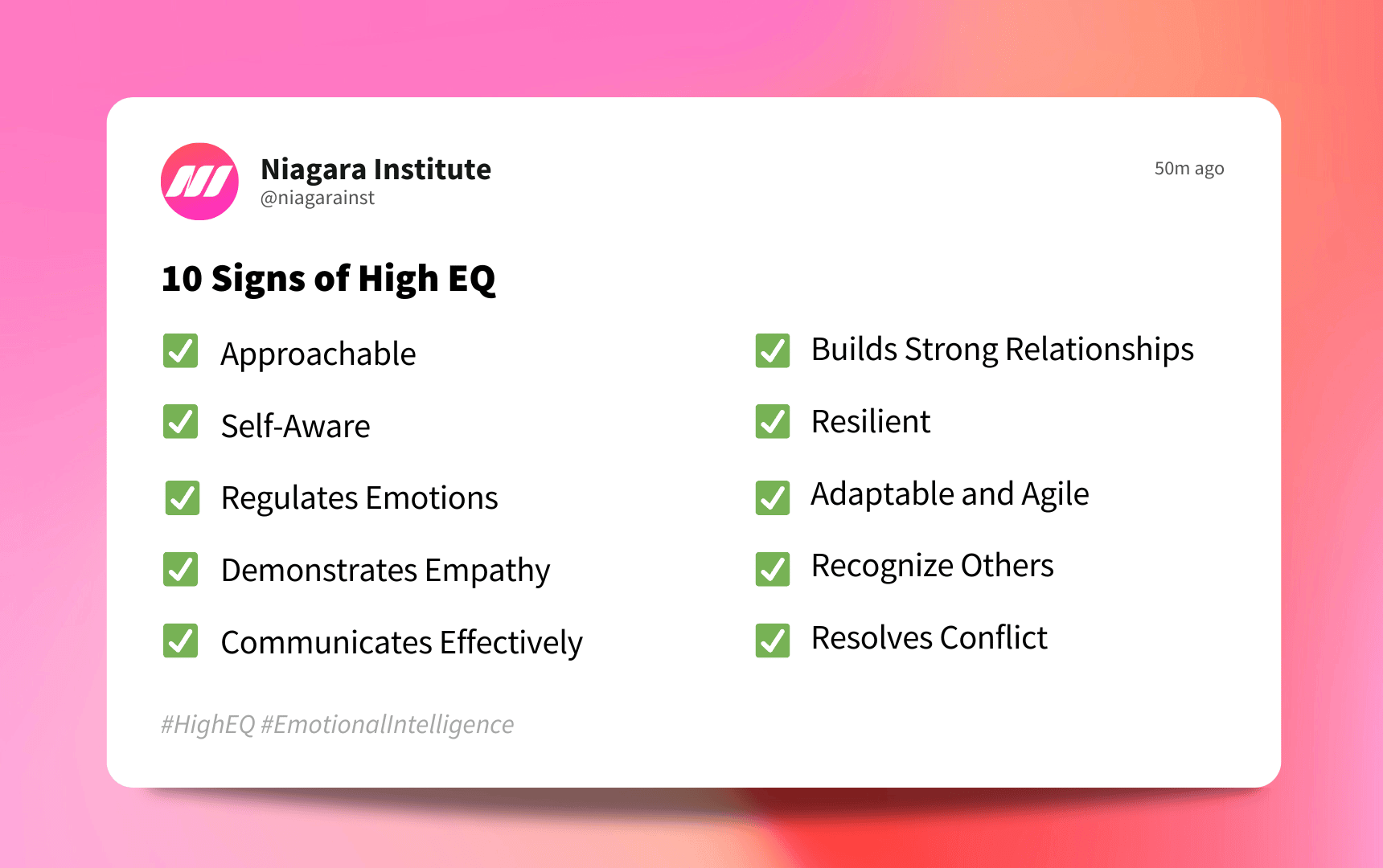5 min read
The Statistics on Emotional Intelligence in the Workplace
You see it all the time: someone is deeply knowledgeable, a strong problem solver, equipped with top-notch technical skills, and can think logically...
.png)
Do you have high EQ? Emotional intelligence, otherwise known as EQ (emotional quotient), has been shown to be a factor in individual success. So much so a Harvard study uncovered that when IQ and technical skills are roughly similar, EQ accounts for nearly 90% of what moves people up the corporate ladder.
While there are significant advantages to having a high EQ, how do you know if you have one? In this article, you’ll learn the meaning of high EQ, the characteristics of high EQ, and examples of individuals with high EQ at work.
Jump to:
High emotional intelligence, often referred to as high EQ (emotional quotient), is when an individual has the ability to notice, discern, and regulate their own emotions and the emotions of others. In the workplace, when an employee has a high EQ, they seemingly effortlessly navigate complex situations, resolve conflict with ease, and maintain trusting and authentic relationships at work. They do so by demonstrating self-awareness, self-regulation, empathy, and effective communication skills.
Now that you know what high EQ means, it’s time to uncover how it comes across in the workplace. If you think you may have high EQ or are looking to develop some of the characteristics of individuals with it, here are 10 high EQ signs to look for at work.

Approachable: Individuals with high EQ are often the ones others go to for advice, direction, and insight at work. Because of their warm demeanor and exemplary listening skills, colleagues naturally gravitate towards them.
Self-Aware: You won’t find someone with high EQ being the person their colleagues say, “Do they realize how they come across?” Instead, through their deep understanding of their thoughts, behaviors, and actions, they can recognize their effect on others and adjust accordingly. Moreover, these individuals know their strengths and limitations, so you can often see them seeking input and advice from others.
Regulates Emotions: Those with high EQ will not be the ones with a reputation for being a hothead or flying off the handle when things go wrong. It’s not that they don’t experience the same feelings as others; they’ve developed strategies to recognize and acknowledge what they’re feeling and understand strong emotions won’t serve them well.
Demonstrates Empathy: Empathy, that is, the ability to understand how others feel and acknowledge their perspective and experience, is a hallmark quality of high EQ. Being able to put themselves in the other person's shoes, those with high EQ can engage with others from a place of understanding of their needs, experiences, and feelings.
Communicates Effectively: Clear communication, where individuals can convey their thoughts and feelings in a way that fosters understanding, is a common characteristic of those with High EQ. In addition, those with high EQ understand the value of active listening and deploy it in their interactions with others.
Builds Strong Relationships: An outcome of having a high EQ is the ability to build strong, long-lasting relationships at work. Through their strong interpersonal skills, high EQ individuals are skilled communicators, active listeners, and can navigate social situations with ease, making them a friend and ally to many in the workplace.
Resilient: Resilience, that is, the ability to overcome and recover from adversity, is directly linked to emotional intelligence. Those with high EQ naturally recognize and manage their emotions, allowing them to deal with challenging situations and pressure more effectively.
Adaptable and Agile: When change is announced or they’re leading it, those with high EQ excel in navigating the pitfalls of change and uncertainty. Instead of going to a place of fear, high EQ individuals control their initial response to seek to understand why change is needed and beneficial.
Recognize Others: You can spot someone with high EQ in the way they put the recognition and acknowledgment of others ahead of themselves. High EQ people don’t thrive on making themselves known; their keen sense of other's feelings drives them to share their kudos frequently.
Resolves Conflict: Emotional intelligence and the ability to resolve workplace conflict go hand in hand. High EQ individuals can gracefully navigate tense situations through exceptional communication skills, empathy, and understanding of others' perspectives.
High EQ can show up in various situations in the workplace. Here is a real-life example of an employee displaying high EQ.
Sarah, a seasoned project manager, has faced many situations that challenged her professionally; the most recent one was her greatest challenge. When a major project deadline loomed, unexpected setbacks emerged, causing stress and tension among team members.
Rather than giving in to pressure, Sarah collected herself before empathetically addressing her team's concerns. She held a team meeting to discuss the challenges openly, creating a safe space for team members to express their frustrations and worries. She acknowledged the team's emotions through active listening and understanding, validating their experiences. From there, Sarah collaboratively worked with her team to find a solution and adjust project timelines.
Her ability to connect with her team, provide support, and lead with empathy not only dissolved tension but also fostered a sense of teamwork, ultimately contributing to the project's successful completion despite the many challenges. Sarah's high EQ benefited the immediate task and strengthened team dynamics.
The benefits of investing in improving emotional intelligence are undeniable, as highlighted by Kevin Guest, author of All The Right Reasons. He said, "Cultivating emotional intelligence among leaders and employees is a game-changing approach to gaining momentum and driving business success. We've found this skill is a linchpin for success across diverse industries and markets globally.”
To gain the benefits, the journey to improving emotional intelligence to develop high EQ differs for each person, requiring an individualized plan. One-on-one coaching, where individuals work with a professional coach who helps them gain greater awareness, harness their strengths, and create an improvement plan, is ideal for achieving high EQ.
.png)
5 min read
You see it all the time: someone is deeply knowledgeable, a strong problem solver, equipped with top-notch technical skills, and can think logically...
.png)
5 min read
What do you do when you feel a strong emotional response to a situation, decision, or encounter in the workplace? Do you bottle it up? Wish it away?...

14 min read
When a team of researchers tracked the careers of high-performing managers over two decades, they discovered something surprising: technical...